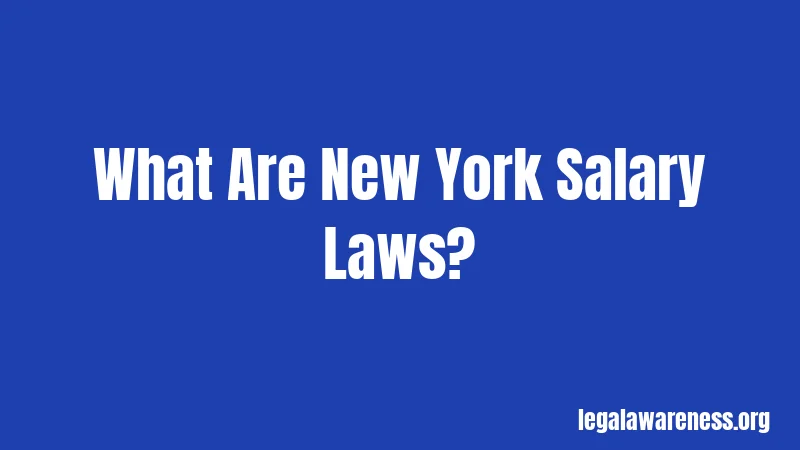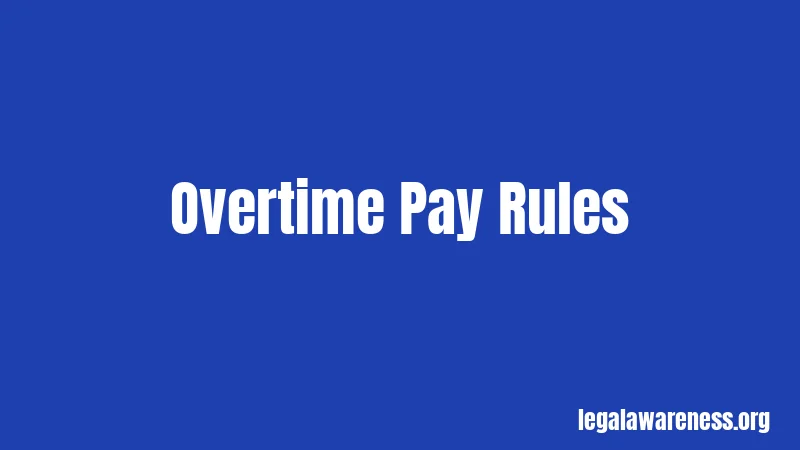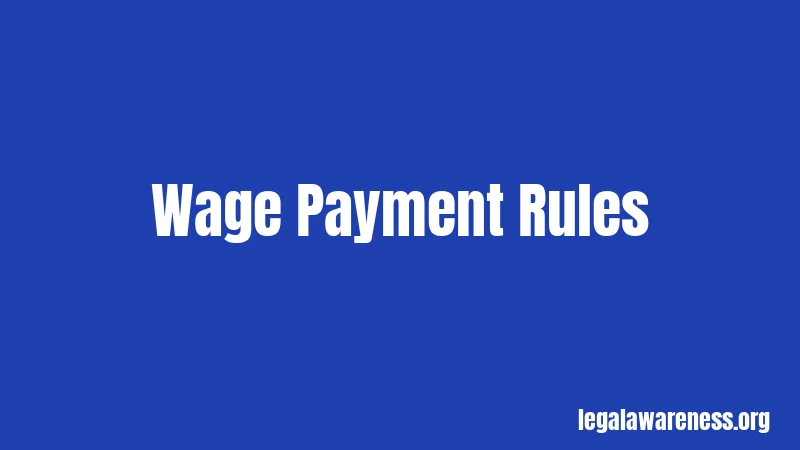New York Salary Laws in 2026: What You Actually Need to Know
Most people have no idea how specific New York’s salary laws are. Seriously. The state has some of the strictest wage rules in the country, and they change regularly. If you’re working in New York or hiring people, you need to understand these rules. Let’s break down exactly what you need to know so you don’t accidentally break the law.
Whether you’re an employee wanting to make sure you’re paid fairly or an employer trying to stay compliant, this guide covers everything that matters. Ready? Let’s go.
What Are New York Salary Laws?

New York salary laws are the rules that set minimum wage, overtime pay, and how employees must be compensated. Basically, they’re designed to protect workers from being underpaid. These laws cover everyone from fast food workers to office employees. The state takes these rules seriously, and violations can get expensive fast.
Here’s what’s important: New York’s laws go beyond just federal rules. The state often has stricter requirements than federal minimum wage laws. That means if you live or work in New York, you follow New York’s rules. Pretty straightforward, right?
Minimum Wage in New York
Let’s start with the most important number: minimum wage. As of 2026, New York’s minimum wage varies depending on where you work and what kind of business you work for. This is where it gets a bit tricky, honestly.
New York City Minimum Wage
In New York City, the minimum wage is higher than anywhere else in the state. Wondering if this applies to you? If you work in NYC, your employer must pay you at least the NYC minimum wage. As of 2026, this amount continues to increase annually. The city adjusts minimum wage every year based on inflation, so the number changes.
Employers can’t pay you less just because you’re new or still learning. The law is clear: minimum wage applies from day one. No exceptions for training periods or entry-level jobs.
Upstate New York Minimum Wage
Outside of New York City, upstate minimum wage is lower but still higher than federal minimum wage. This includes areas like Buffalo, Rochester, and the surrounding regions. The law applies to all businesses, regardless of size.
Not sure what counts as upstate? Basically, it’s anywhere outside the five boroughs of New York City. Westchester County has its own special rules too. It’s more nuanced than you might think, but your employer should know which rate applies to you.
Nassau, Suffolk, and Westchester Counties
These suburban areas have their own minimum wage rates that sit between NYC and upstate levels. Think of it like a middle ground. These counties adjusted their rates on a schedule similar to NYC but at slightly different amounts. Your employer is required to pay whichever rate is highest for your location.
Stay with me here. The point is simple: wherever you work in New York, there’s a minimum wage. Your employer must pay it. No excuses, no exceptions.
Overtime Pay Rules

Okay, pause. Read this carefully. Overtime pay is where a lot of people get confused. New York has specific rules about when you get overtime and how much you should be paid.
In New York, you’re entitled to overtime if you work more than 40 hours in a single week. Overtime pay must be at least one and a half times your regular hourly rate. So if you normally earn $20 per hour, overtime is at least $30 per hour. Pretty significant difference, right?
Here’s what surprises people: some employers think certain jobs don’t qualify for overtime. That’s wrong. Unless your job qualifies for a specific exemption, you’re entitled to overtime. Sales employees, managers, and other positions still get overtime unless they meet strict requirements. Don’t let your boss tell you otherwise.
The exemptions do exist, but they’re narrow. You have to meet specific criteria about your job duties and salary level. This isn’t something employers can just decide on their own. It has to follow New York law exactly.
Double Time Pay
Wait, it gets better. In some cases, you might earn even more. If you work more than 12 hours in a single day, you get paid double time for those extra hours. Double time is twice your regular hourly wage. So that $20 per hour job becomes $40 per hour for those extra hours.
This applies to many industries, including hospitality, manufacturing, and transportation. Your employer has to track this carefully. If they’re not paying you double time when required, they’re breaking the law.
Salary Exemption Rules
Not everyone in New York gets paid hourly. Some employees are salaried. But even salaried employees have protections under New York law. You’re not alone, this confuses a lot of people.
For a salaried employee to be exempt from overtime, certain conditions must be true. First, you need to earn a minimum salary threshold. This amount changes yearly in New York. For 2026, salaried employees must earn at least a certain amount per week to be considered exempt from overtime rules.
Second, your job duties matter. You can’t just have the word “manager” in your title and avoid overtime. Your actual job responsibilities have to match the legal definition. You typically need to supervise employees, have hiring and firing authority, or manage important business operations.
Honestly, this is the part most people miss. Many employers misclassify employees as exempt when they shouldn’t be. If you think you’re misclassified, you might have a case. You could owe significant back pay.
Wage Payment Rules

Here’s where it gets serious. New York law is strict about how and when you get paid. Your employer can’t just pay you whenever they feel like it.
Employees must be paid at least twice per month. That means payday happens at least twice every 30 days. Some employers pay weekly, which is even better for you. The law sets minimum standards, and employers can exceed them but can’t do less.
Your paycheck needs to include specific information. It should show your gross wages, deductions, and net pay. You have the right to understand exactly how much you earned and why deductions were taken. If your paycheck is confusing or missing information, that’s a problem.
Deductions From Your Paycheck
Not all deductions are legal. Your employer can’t just take money whenever they want. Certain deductions are allowed, like taxes and Social Security. Others, like uniforms or tools, can only be deducted if they don’t bring you below minimum wage.
Here’s the important part: even if you agree to a deduction, it might still be illegal. Honest conversation, agreements don’t override New York law. If a deduction violates the law, your employer can’t do it, no matter what you signed.
Some employers charge for damage you caused or money that went missing. New York limits these deductions too. They can’t reduce your pay below minimum wage, and they have to follow specific procedures. If your employer is taking money illegally, contact the Department of Labor.
Paid Time Off Laws
You’re probably wondering about vacation days, sick days, and paid time off. New York’s rules on this are important and continue to expand.
Paid Sick Leave
As of recent updates, New York requires most employers to provide paid sick leave. The amount depends on business size. Large employers must give employees at least 40 hours of paid sick leave per year. Smaller employers must provide at least 40 hours too, but it can accrue over time instead of all upfront.
You can use sick leave for your own illness, caring for a family member, or situations related to domestic violence. The law is broad about what counts. You don’t need a doctor’s note for the first three days. Your employer can’t ask a lot of questions or make it difficult to use your time.
Vacation Days
Wait, here’s where it’s interesting. New York doesn’t require employers to provide vacation days. That’s surprising to many people. However, if your employer does give vacation days, they must follow specific rules about paying them out when you leave.
If you’re laid off or fired, you’re entitled to pay for unused vacation days. Your employer can’t just take that money. This is actual law, not a company policy choice. Even if you quit, the rules might require vacation payout depending on your employer’s written policy.
Personal Days
Some employers offer personal days separate from vacation and sick leave. These follow similar rules to vacation. If they’re offered, unused days often need to be paid out upon termination. Check your employee handbook or ask your HR department.
Meal and Rest Breaks
New York requires employers to provide meal and rest breaks. Don’t worry, we’ll break it down step by step.
Employees are entitled to a 30-minute unpaid meal period after six hours of work. This is standard for most employees. You can’t waive this break just because you want to work through it. Your employer has to provide it and let you take it.
For breaks less than six hours of work, the rules are different. Employees working less than six hours still get at least a lunch break, but the timing and structure can vary. Your industry and specific job might have different requirements.
New York Prevailing Wage Laws
Hold on, this part is important. If you work on public construction projects, different rules apply. Prevailing wage laws ensure workers on government-funded projects earn fair wages.
Prevailing wage is significantly higher than regular minimum wage. The rates vary by job type and location. A construction worker on a prevailing wage project might earn $50-60+ per hour. This isn’t a bad thing. It’s designed to prevent companies from undercutting each other with low wages.
If you think you’re working on a prevailing wage project, ask your employer. They’re required to pay these rates. If they claim your project isn’t covered, double-check. The consequences for violating prevailing wage laws are serious.
Independent Contractors vs. Employees
Here’s where misclassification happens. Some employers call workers “independent contractors” to avoid paying minimum wage and overtime. This is illegal in most cases.
New York uses specific tests to determine if someone is an employee or contractor. It’s not just what your employer calls you. Your actual working relationship matters. If you work regularly for one company and they control your work, you’re probably an employee. Independent contractors typically work for multiple clients and control their own work.
I looked this up recently. The rules are stricter than many people realize. Your employer can’t just decide you’re a contractor. New York law determines your status based on the facts of your work. If you’re misclassified, you might be owed back wages and overtime.
Penalties for Violations
So what happens if your employer breaks these laws? The penalties can hit hard.
Employers who violate minimum wage laws can owe employees back pay plus penalties. If it’s intentional, the penalties are larger. The Department of Labor can recover wages for employees, and employers might face fines on top of that. For violations involving more than one employee, the costs add up fast.
Overtime violations are taken seriously too. Employers must pay back overtime wages, and they might owe additional penalties. Some cases result in lawsuits where employees recover their unpaid wages plus attorney fees. This gets expensive for employers, which is why compliance matters.
Wage theft, which includes not paying overtime or minimum wage, is now treated as a crime in New York. Serious violations can result in criminal charges. Honestly, this is the enforcement that’s changing the game for workers.
Recent Changes to New York Salary Laws
New York updates its wage laws regularly. Minimum wage continues to increase annually. The state has also been expanding paid sick leave requirements and cracking down on wage theft.
As of recent years, New York implemented stricter overtime exemption rules. The salary thresholds for exemptions have increased substantially. More employees who were classified as exempt can now claim overtime. This has been a big shift in how employers classify workers.
Labor regulations continue to evolve in New York. Future changes might expand paid time off, increase minimum wage further, or add new protections. Stay informed about updates from the New York Department of Labor.
How to Report Wage Violations
If you believe your employer is violating salary laws, you have options. You’re not powerless here.
The first step is documenting everything. Keep records of hours worked, wages paid, and any communications about pay. Take screenshots or photos. Write down dates and what happened. This documentation is crucial if you decide to report or sue.
You can file a complaint with the New York Department of Labor. They investigate wage violations at no cost to you. The process is free, and you have legal protection against retaliation. Your employer can’t fire you for reporting violations.
Another option is consulting with an employment lawyer. Many lawyers work on contingency, meaning you don’t pay unless they win your case. They recover their fees from your settlement. If you’ve lost significant wages, a lawyer might be worth it.
How to Stay Compliant If You’re an Employer
If you’re running a business in New York, compliance isn’t optional. Here’s what you need to do.
First, know the minimum wage rates that apply to your location and industry. Update your systems whenever rates change. More than half of employers get this wrong because rates change so frequently. Set reminders for yourself.
Second, properly classify employees. Don’t guess about exemptions. If an employee does the work of a regular hourly employee, they should be classified as hourly. Consult with an HR professional or attorney if you’re unsure.
Third, track hours carefully. Keep detailed records of all hours worked. Payroll software can help with this. Include overtime, breaks, and any other relevant information. These records protect you and your employees.
Fourth, pay on time and include all required information on paychecks. Set up your payroll system correctly. Include gross wages, deductions, and net pay clearly. When in doubt about what’s required, contact the Department of Labor.
Frequently Asked Questions
What is the current New York City minimum wage for 2026? New York City’s minimum wage increased to a specific rate in 2026. The city adjusts it annually based on inflation. Check the NYC Department of Consumer Affairs website for the exact current rate, as it updates yearly.
Can my employer make me work during my lunch break? No. Your employer must provide a meal break, and you’re entitled to take it unpaid. They can’t force you to work during this time or deduct it from your pay.
Am I entitled to overtime if I’m salaried? Only if you don’t meet the exemption requirements. Most salaried employees do qualify for overtime unless they earn above the threshold salary and perform managerial duties.
What should I do if my employer isn’t paying me minimum wage? Document everything and file a complaint with the New York Department of Labor. You can also consult an employment lawyer about potential legal action.
Can my employer take my paycheck to cover damaged equipment? Only if it doesn’t bring you below minimum wage and your employer follows proper procedures. Even then, limitations apply. Check with the Department of Labor if you think this is happening illegally.
Are remote employees entitled to New York salary protections? If you work for a New York company or your employer is based in New York, you’re generally covered. Location matters, but most remote workers are protected if their employer is in New York.
Do independent contractors have to be paid minimum wage? No, but many people are misclassified as contractors when they’re actually employees. If you work regularly for one company and they control your work, you might be an employee.
What happens if my employer retaliates after I report wage violations? Retaliation is illegal. You can report it to the Department of Labor and might have a separate legal claim. Many people win retaliation cases.
Final Thoughts
New York’s salary laws are strict, but they exist to protect you. Whether you’re an employee or employer, understanding these rules matters. Employees deserve fair pay, and employers who follow the law build better relationships with their teams.
The key takeaway: know your rights and know the rules. If something seems wrong about your paycheck or work situation, it probably is. Don’t assume your employer knows the rules perfectly. The Department of Labor exists to help, and using it isn’t overreacting.
Now you know the basics. Stay informed, stay safe, and when in doubt, ask questions or contact the New York Department of Labor. Your wallet will thank you.
References
New York State Department of Labor – Minimum Wage
New York Prevailing Wage Requirements
NYC Department of Consumer Affairs – Minimum Wage
New York Department of Labor – Wage and Hour Compliance
NYS Department of Labor – Overtime Rules
